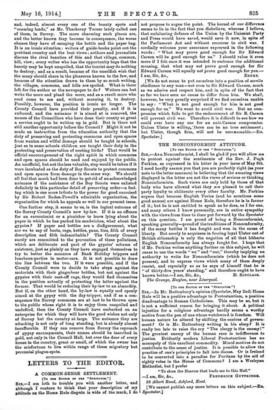LETTERS TO THE EDITOR.
A COMMON-SENSE SETTLEMENT.
[To oRm Eames or Fill ..SPIICTAT011."] am loth to trouble you with another letter, and nIthough I venture to think that your description of my attitude on the Home Rule dispute is wide of the mark, I do not propose to argue the point. The kernel of our difference seems to lie in the fact that you disbelieve, whereas I believe, that unfaltering defence of the Union by the Unionist Party and Press would have saved, would save it now, in spite of the Parliament Act and without recourse to civil wan I cordially welcome your assurance exprefsed in the following words "What may prove good enough for Sir Edward Carson will be good enough for us." I should value it even more if I felt sure it was intended to embrace the additional meaning, that what may not prove good enough for Sir Edward Carson will equally not prove good enough for you.—
[We do not mean to put ourselves into a position of servile obedience to any man—not even to Sir Edward Carson, much as we admire and respect him, and in spite of the fact that so far we have seen no cause to differ from him. We shall, however, be very greatly surprised if we find ourselves unable to say: " What is not good enough for him is not good enough for us." We want to avoid civil war. But no com- promise which fails to get the endorsement of Sir E. Carson will prevent civil war. Therefore it is difficult to see how we could ever have any use for an anti-Carson compromise. Unless Ulster is willing, 'there can be no true settlement ; but Ulster, though firm, will not be unreasonable.—En. Spectator.]










































 Previous page
Previous page